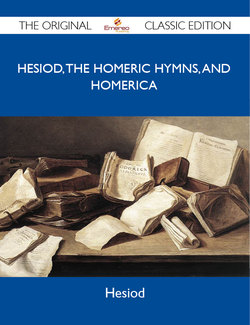Hesiod, the Homeric Hymns, and Homerica - The Original Classic Edition

Описание книги
The translations are easy to read and not too difficult to comprehend, while still at the same time accurately rendered. <p> But what makes this book of keen interest is not the attention paid to Hesiods Theogony and Works & Days, nor the anonymous Homeric Hymns, but rather to its meticulous compedium of the lesser-known works it presents. Especially, for those works for which no complete version has survived, only fragments and occassional (later) commentaries. <p> In this volume you discover a wonderful epic poem called The Catalogue of Women and Eoie, of which only about half survives scattered among a hundred or so fragments. You also discover The Shield of Hercules, which some attribute to Hesiod. But most fascinating of all are the fragments of the Epic Cycle, poems written as a sort of history of the Greek people, of which the two great works by Homer (The Iliad and The Odyssey) were the most well-known and the only ones to survive intact. As far as I know, this is the only volume in english which gathers all of these fragments together and attempts to sort them out in some kind of order; for those interested in the ancient epics, this alone makes the edition worth the price. <p> This book is a sobering reminder of just how much has been lost over the centuries, of just how little actually has survived. Sadly, this is now probably the closest anyone will ever get to being able to read The Cypriad or The Melampodia again, and thats a shame.
Отрывок из книги
Contents PREPARER'S NOTE: PREFACE
INTRODUCTION General
.....
up in the words of the Muses to the writer of the "Theogony": `We can tell many a feigned tale to look like truth, but we can, when we will, utter the truth' ("Theogony" 26-27). Such a poetry could not be permanently successful, because the subjects of which
it treats--if susceptible of poetic treatment at all--were certainly not suited for epic treatment, where unity of action which will sustain interest, and to which each part should contribute, is absolutely necessary. While, therefore, an epic like the "Odyssey" is an organism and dramatic in structure, a work such as the "Theogony" is a merely artificial collocation of facts, and, at best, a pageant. It is not surprising, therefore, to find that from the first the Boeotian school is forced to season its matter with romantic episodes, and that later it tends more and more to revert (as in the "Shield of Heracles") to the Homeric tradition.
.....
